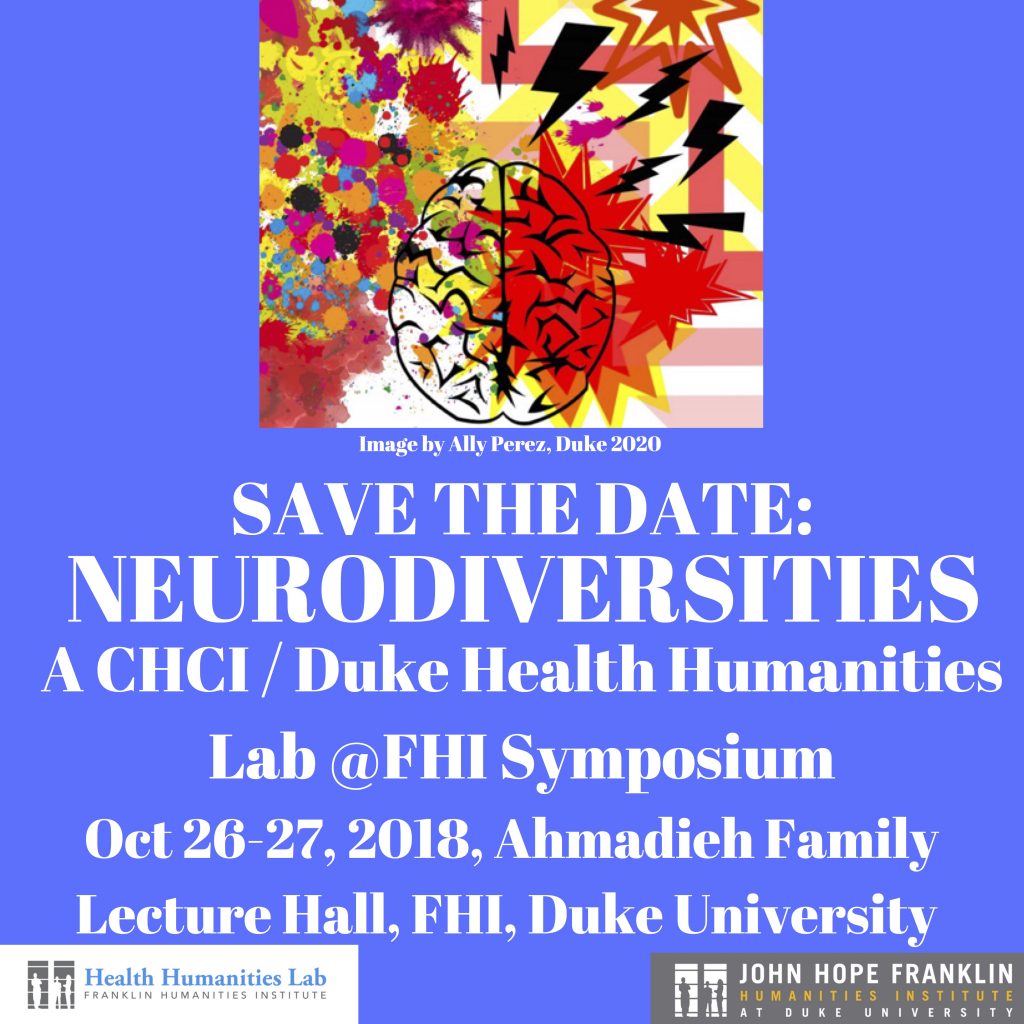NEURODIVERSITIES
A CHCI Medical Humanities Network / Duke Health Humanities Lab@FHI Symposium
ABOUT
The term "neurodiversity," first popularized by the autism community, challenges the pathologization of neurological deviation from socially constructed notions of "neurotypicality." Another branch of "neurodiversity" discourse challenges the abstraction of the ideas of "mind" and "mental" states, using tools of empirical neuroscience to dismantle binary divides between "brainhood" and "embodiment." Psychiatry now grapples with the implicit Western cultural "typicality" embedded in medical frameworks. In the humanities, the study and teaching of literature and the arts is experiencing revitalization through interrogation of traditional conceptions of cognition and consciousness, along with humanistic exploration of questions raised by neuroscientific experimentation. Through Friday keynotes, panels, an evening film screening and Saturday interactive workshops, we invite participants to engage with five central areas of concern.
SCHEDULE
DATES: October 26-27, 2018
LOCATION: Franklin Humanities Institute, Ahmadieh Family Lecture Hall, Bay 4, Smith Warehouse, Duke University
Friday, October 26, 2018
9:00-9:30 Breakfast and Welcome: Ranjana Khanna, Deborah Jenson
9:30-11:00 Panel: Brainhood, Self-Concepts, and the Perils of Neuroconformity with Catherine Reilly, Nima Bassiri, and Deborah Jenson.
Nima Bassiri, "Conduct Disorders in the 19th Century"
Catherine Reilly, "Cruel Translation: Psychoanalysis and Worlding."
Deborah Jenson, "Flaubert’s Brain: Epilepsy, Mimesis, and Injured-Self Narrative"
11:00-11:15 15-minute break
11:15-12:45 Richard C. Keller, "World Mental Health Twenty Years Later: The Impact and Limitations of a UN Report"
The UN’s World Mental Health, published in 1999, established mental illness as a global health crisis for the first time. This talk examines the impact of that report, and places it in the context of the disciplinary history of ethnopsychiatry, a field that gradually emerged over the course of the twentieth century as transcultural psychiatrists came to grapple with their colonial heritage and the ethical dilemmas of practice in a postcolonial context.
12:45-1:45 Lunch
1:30-3:00 Nick Sousanis, Unflattening Thought and Embodiment
3:00-3:15 15-minute break
3:15-4:45 Ralph Savarese, "’The Body Is A Big Sagacity’: Reading Leslie Marmon Silko’s Ceremony with Autist Jamie Burke."
Jamie Burke learned to speak through innovative occupational therapy at age thirteen. At Syracuse University, he minored in Native American Studies, studying the tribes of the Haudenosaunee Confederacy. Jamie and the author spent several months discussing Leslie Marmon Silko’s novel Ceremony, in which a mixed-race veteran returns from combat to the Laguna Pueblo reservation in a state of traumatized dysfunction. Jamie’s familiarity with Native American culture and his talents as a "spatial visualizer" helped to illuminate the novel’s spiritual geography, which has often perplexed readers. Exploring a new emphasis in the scientific literature on motor impairments in autism—both their wide-ranging repercussions and potential amelioration—the chapter juxtaposes Jamie’s improbable journey to speech with the protagonist’s improbable journey to wholeness through ceremonial movement. A Native understanding of health as relation (to land, community, past and one’s own body) is foregrounded.
4:45-5:45 Reception by Comfort Cuisine
Book Table: Ralph Savarese, See It Feelingly: Classic Novels, Autistic Readers, and the Schooling of a No-Good English Professor (Duke UP, October 2018)
6:30-7:45 Documentary Neurodiversities Screening of the Peabody Award-winning documentary Deej
7:50-8:20 Audience Q & A with filmmaker DJ Savarese
Saturday, October 27, 2018
9:45-10:00 Light Breakfast
10:00-11:30 DJ Savarese, Perspectives, Poetry, and Personhood
In this interactive workshop, DJ Savarese facilitates a discussion of a poem from his ekphrastic series A Doorknob for the Eye (Unrestricted Interests Press, 2017) before inviting participants to examine multiple perspectives of their own lived experience.
11:30-11:45 15-minute break
11:45-1:15 Roundtable: For a Pedagogy of Resiliency with Marion Quirici, Danielle Oakley, and Jonathan Hill-Rorie
Campus health, disability scholars/advocates, and neurodiversity leaders guide faculty, students, and community members on how to work proactively with structures and initiatives to assess and shore up student resiliency, forestall or manage crises, and make a home in universities for neurodiversities. The interactive guidance provided here on Duke infrastructure including CAPS, DukeReach, the Student Wellness Center, the Duke Disability Alliance, and Narrative Medicine Mondays will provide insights on how to locate similar resources on other campuses, or to ally and advocate for needed initiatives. Student stress and vulnerability to crisis is rising nationally. How can we develop a pedagogy of resiliency to complement Freire’s "education as the practice of freedom"?
1:15-1:45 Lunch
1:45-3:00 Nick Sousanis, Thinking in Comics
Co-Sponsors: FHI Humanities Futures; DIBS/FHI Neurohumanities Research Group; UNC Institute for Arts & Humanities & HHIVE
Faculty, students and community members are welcome. Events will include refreshments. For queries about access, contact Health Humanities Lab Manager Katherine Berko (kib3@duke.edu).







